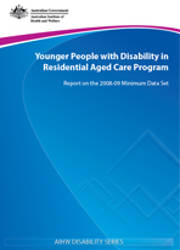Summary
The YPIRAC program
The Younger People with Disability in Residential Aged Care (YPIRAC) program is a 5-year program agreed on by the Council of Australian Governments. It aims to reduce the number of people with disability aged less than 65 who live in residential aged care. The 2008–09 year is the third year of the program.
The people
In 2008–09 a total of 817 people received services funded by the YPIRAC program. This represents a 41% increase on the number of people receiving services in 2007–08.
Three-quarters of YPIRAC service users in 2008–09 were aged less than 50 years, the initial priority group for the program.
One in 10 service users was of Aboriginal or Torres Strait Islander origin and about 6% were from non-English-speaking backgrounds.
Nearly half (47%) of all service users had a primary disability relating to acquired brain injury, and another 29% had a neurological primary disability. Many service users had high and complex needs: 1 in 10 reported having four or more disability groups, and the average number of disability groups per service user was nearly 2 (1.93).
Residential setting
Almost two-thirds (64%) of YPIRAC service users lived in residential aged care at the end of the reporting period. Of these, nearly 2 in 5 reported that their main reason for living there was because appropriate alternative accommodation was not available.
Around 3 in 10 YPIRAC service users were to remain in residential aged care (YPIRAC target groups 3 and 4), but the great majority of these (89%) were to receive, or had received, additional disability support services.
YPIRAC services
Of all YPIRAC service users in 2008–09, nearly 3 in 10 (234) were offered alternative accommodation and, of these, over half (124) moved to alternative accommodation such as private residences, domestic-scale supported living facilities and supported accommodation.
Nearly two-thirds of YPIRAC service users received a support services package in 2008–09, and 15% of all service users received both alternative accommodation and support services.
YPIRAC from 2006–07 to 2008–09
An estimated 947 people received services from the YPIRAC program during the first 3 years of its operation. Of these, 163 (17%) received alternative accommodation and 392 (41%) received support services packages.



